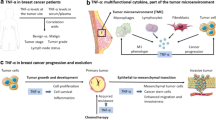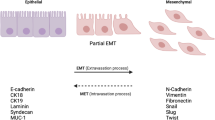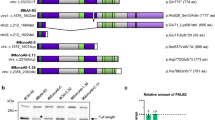Abstract
TheMDM2 protein, an oncogene product, is known to act by suppressing p53 function. Although gene amplification ofMDM2 was frequently detected in human sarcomas, it was uncommon in the majority of epithelial tumors including breast cancer. However, recent reports have demonstrated that its translational activity is enhanced in a variety of carcinomas. In this report, we summarized the implications ofMDM2 overexpression in human breast cancer from the literature as well as our preliminary results.
Similar content being viewed by others
Abbreviations
- ER:
-
Estrogen receptor
References
Cahilly-Snyder L, Yang-Feng T, Francke U,et al: Molecular analysis and chromosomal mapping of amplified genes isolated from a transformed mouse 3T3 cell line.Somat Cell Mol Genet 13:235–244, 1987.
Meltzer PS: MDM2 and p53; A question of balance.J Natl Cancer Inst 86:1265–1266, 1994.
Russie PH, Gorina S, Marechal V,et al: Structure of the MDM2 oncoprotein bound to the p53 tumor suppressor transactivation domain.Science 274:948–953, 1996.
Finlay CA: Themdm-2 oncogene can overcome wild-type p53 suppression of transformed cell growth.Mol Cell Biol 13:301–306, 1993.
Wu X, Bayle JH, Olson D,et al: The p53-mdm-2 autoregulatory feedback loop.Genes Dev 7:1126–1132, 1993.
Barak Y, Juven T, Haffner R,et al: mdm2 expression is induced by wild type p53 activity.EMBO J 12:461–468, 1993.
Xiao Z-X, Chen J, Levine AJ,et al: Interaction between the retinoblastoma protein and the oncoprotein MDM2.Nature 375:694–697, 1995.
Martin K, Trouche D, Hagemeier C,et al: Stimulation of E2F1/DPI transcriptional activity by MDM2 oncoprotein.Nature 375:691–694, 1995.
Haupt Y, Maya R, Kazaz A,et al: Mdm2 promotes the rapid degradation of p53.Nature 387:296–299, 1997.
Shvarts A, Steegenga WT, Riteco N,et al: MDMX; A novel p53-binding protein with some functional properties of MDM2.EMBO J 15:5349–5357, 1996.
Kondo S, Kondo Y, Hara H,et al:mdm2 gene mediates the expression ofmdr 1 gene and P-glycoprotein in a human glioblastoma cell line.Br J Cancer 74:1263–1268, 1996.
Leach FS, Tokino T, Meltzer P,et al:p53 mutation andMDM2 amplification in human soft tissue sarcomas.Cancer Res 53:2231–2234, 1993.
Khatib ZA, Matsushime H, Valentine M,et al: Coamplification of theCDK4 gene withMDM2 andGL1 in human sarcomas.Cancer Res 53:5535–5541, 1993.
Ladanyi M, Lewis R, Jhanwar SC,et al:MDM2 andCDK4 gene amplification in Ewing’s sarcoma.J Pathol 175:211–217, 1995.
Bueso-Ramos CE, Yang Y, Manshouri T,et al: Molecular abnormalities ofMDM-2 in human sarcomas.Int J Oncol 7:1043–1048, 1995.
Reifenberger G, Liu L, Ichimura K,et al: Amplification and overexpression of theMDM2 gene in a subset of human malignant gliomas withoutp53 mutations.Cancer Res 53:2736–2739, 1993.
Habuchi T, Kinoshita H, Yamada H,et al: Oncogene amplification in urothelial cancers with p53 gene mutation or MDM2 amplification.J Natl Cancer Inst 86:1331–1335, 1994.
Baunoch DA, Watkins LF, Tewari A,et al: MDM2 overexpression in benign and malignant lesions of the human breast; Association with ER expression.Int J Oncol 8:895–899, 1996.
Lianes P, Orlow I, Zhang Z-F,et al: Altered patterns of MDM2 and TP53 expression in human bladder cancer.J Natl Cancer Inst 86:1325–1330, 1994.
Adesina AM, Nalbantoglu J, Cavenee WK:p53 gene mutation andmdm2 gene amplification are uncommon in medulloblastoma.Cancer Res 54:5649–5651, 1994.
Foulkes WD, Stamp GWH, Afzal S,et al: MDM2 overexpression is rare in ovarian carcinoma irrespective ofTP53 mutation status.Br J Cancer 72:883–888, 1995.
Yamasaki I, Furihata M, Ohtsuki Y,et al: Overexpression of MDM2 and p53 protein is infrequently but significantly associated with progression of human prostatic adenocarcinoma.Oncol Reports 3:925–929, 1996.
Girod SC, Cesarz D, Fischer U,et al: Detection of p53 and MDM2 protein expression in head and neck carcinogenesis.Anticancer Res 15:1453–1458, 1995.
Landers JE, Haines DS, Strauss III JF,et al: Enhanced translation; A novel mechanism ofmdm2 oncogene overexpression identified in human tumor cells.Oncogene 9:2745–2750, 1994.
Hunter SB, Abbott K, Varma VA,et al: Reliability of differential PCR for the detection of EGFR and MDM2 gene amplification in DNA extracted from FFPE glioma tissue.J Neuropathol Exp Neurol 54:57–64, 1995.
Berberich S, Cole M: Themdm-2 oncogene is trans-located and overexpressed in a murine plasmacytoma cell line expressing wild-type p53.Oncogene 9:1469–1472, 1994.
Marks DI, Kurz BW, Link MP,et al: Altered expression of p53 andmdm-2 proteins at diagnosis is associated with early treatment failure in childhood acute lymphoblastic leukemia.J Clin Oncol 15:1158–1162, 1997.
Bueso-Ramos CE, Yang Y, deLeon E,et al: The human MDM-2 oncogene is overexpression in leukemias.Blood 82:2617–2623, 1993.
Huang YQ, Raphael B, Buchbinder A,et al: Rearrangement and expression of MDM2 oncogene in chronic lymphocytic leukemia.Am J Hematol 47:139–141, 1994.
Chilosi M, Doglioni C, Menestrina F,et al: Abnormal expression of the p53-binding protein MDM2 in Hodgkin’s disease.Blood 84:4295–4300, 1994.
Marchetti A, Buttitta F, Girlando S,et al: mdm2 gene alterations and mdm2 protein expression in breast carcinomas.J Pathol 175:31–38, 1995.
Quesnel B, Preudhomme C, Fournier J,et al: MDM2 gene amplification in human breast cancer.Eur J Cancer 30A:982–984, 1994.
McCann AH, Kirley A, Carney DN,et al: Amplification of theMDM2 gene in human breast cancer and its association with MDM2 and p53 protein status.Br J Cancer 71:981–985, 1995.
Inada Toi M, Yamamoto Y,et al: Immunocyto-chemical analysis of MDM2 protein expression and its relevance to tumor angiogenesis in primary breast cancer.Oncol Reports 3:667–671, 1996.
Sheikh MS, Shao Z-M, Hussain A,et al: Thep53- binding proteinMDM2 gene is differentially expressed in human breast carcinoma.Cancer Res 53:3226–3228, 1993.
Gudas JM, Nguyen H, Klein RC,et al: Differential expression of multiple MDM2 messenger RNAs and proteins in normal and tumorigenic breast epithelial cells.Clin Cancer Res 1:71–80, 1995.
Bureau JF, Bihl F, Brahic M,et al: The gene coding for interferon-γ is linked to the D125335 and D125313 microsatellites and to the MDM2 gene.Genomics 28: 109–112, 1995.
Sigalas I, Calvent AH, Anderson JJ,et al: Alternatively spliced mdmd2 transcripts with loss of p53 biding domain sequences; Transforming ability and frequent detection of human cancer.Nature Med 2:912–917, 1996.
Aas T, Borresen AL, Geisler S,et al: Specific P53 mutations are associated withde novo resistance to doxorubicin in breast cancer patients.Nature Med 2: 811–814, 1996.
Rusch V, Klimstra D, Venkatraman E,et al: Aberrant p53 expression predicts clinical resistance to cisplatin-based chemotherapy in locally advanced non-small cell lung cancer.Cancer Res 55:5038–5042, 1995.
Chaney SG, Sancar A: DNA repair; Enzymatic mechanisms and relevance to drug response.J Natl Cancer Inst 88:1346–1360, 1996.
Kondo S, Barnett GH, Hara H,et al: MDM2 protein confers the resistance of a human glioblastoma cell line to cisplatin-induced apoptosis.Oncogene 10:2001–2006, 1995.
Hideshima T, Shinohara T, Baba M,et al: The expression of MDM2 and p53 protein in breast carcinoma.Oncol Reports 4:297–300, 1997.
Picksley SM, Vojtesek B, Sparks A,et al: Immunochemical analysis of the interaction of p53 with MDM2; Fine mapping of the MDM2 binding site on p53 using synthetic peptides.Oncogene 9:2523–2529, 1994.
Zauberman A, Barak Y, Ragimov N,et al: Sequence-specific DNA binding by p53; Identification of target sites and lack of binding to p53-MDM2 complexes.EMBO J 12:2799–2808, 1993.
Author information
Authors and Affiliations
About this article
Cite this article
Toi, M., Saji, S., Suzuki, A. et al. MDM2 in breast cancer. Breast Cancer 4, 264–268 (1997). https://doi.org/10.1007/BF02966519
Issue Date:
DOI: https://doi.org/10.1007/BF02966519




